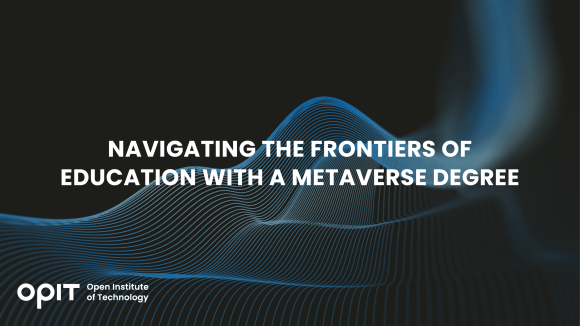

Interest in the potential of the metaverse is skyrocketing. This virtual landscape shows promising innovations in the way an average user interacts with tech. Using a blend of augmented reality (AR), virtual reality (VR), and blockchain technology, it promises to elevate user experience to new heights.
But it’s not just techies that are rejoicing. The metaverse will bring new marketing, brand-building, and sales opportunities for businesses of all sizes. And even more exciting – it promises to supercharge one of the globe’s fastest-growing entertainment sectors, gaming.
Those wanting to get in on the ground floor of the rapidly growing business and employment opportunities of the metaverse should carefully evaluate the advantages of a metaverse degree.
The metaverse is attracting some large investments from technology leaders, including Apple, Google, and Meta (previously known as Facebook). Even Microsoft has staked a claim to the immersive digital universes promised by Meta’s Metaverse.
With this much investment, it seems certain that the metaverse is here to stay.
The metaverse provides a new generation of business leaders and innovators a unique opportunity in this fast-evolving space. For these aspirant leaders, leveraging the opportunities of the metaverse will require a multidisciplinary degree. Those equipped with this specialized education will be in a prime position to enter the rapidly evolving metaverse-related employment market and adapt to the digital landscape’s changes.
Best On- and Off-Line Metaverse Degrees
Citibank estimates that the pool of metaverse users could top 5 billion by 2030 and that by then, metaverse business may be worth around $13 trillion.
The potentially explosive growth of metaverse career opportunities means that choosing the right provider of on or offline degree courses is essential. Given increasing demand, it is no surprise that some of the most respected technology-focused higher education institutions are providing some cutting-edge options for advanced study. These institutions embrace a multidisciplinary approach to the intersection of technology, business, and creativity.
Here are the five best metaverse degrees currently available:
Carnegie Mellon University – The Master of Human-Computer Interaction (MHCI) Program
This three-semester program consists of core courses such as the Capstone course – a seven-month R&D team project with an external industry client. The offering from Carnegie-Mellon claims to be the first program dedicated to preparing innovators and professionals for a career in human-computer interaction, user experience design, and user-focused research.
The University of Washington – MSc in Human-Centered Design and Engineering (HCDE)
The University of Washington MSC is a flexible course that offers a part-time or full-time degree. The program’s core courses include Theoretical Foundations of Human-Centered Design & Engineering, Navigating Design in Organizational Contexts, Visual Communication, and User-Centered Design.
University of Queensland – Master of Interaction Design
The University of Queensland’s course takes two years to complete, one of the lengthiest on this list. It incorporates core courses such as Design Thinking, Digital Prototyping, Human-Computer Interaction, and Social and Mobile Computing. Rather than focusing on the technology that will power the metaverse, this master’s degree focuses on how users interact with virtual environments. Those who qualify will become Interaction Designers, creating user-friendly and accessible digital products.
UCL (London, England) – The Human-Computer Interaction MSc
The UCL 12-month degree program is focused on sharpening their students’ real-world skills, with courses such as Interaction Design, Interaction Science, and the MSc HCI Project. This interdisciplinary MSc is centered on practical and professional skills related to the design and use of computer and mobile technology, with a concentration on interface usability.
University of Southern California (USC) – Master of Fine Arts in Interactive Media
As the lengthiest program on this list at three years, the USC degree features core courses such as Experiments in Interactivity, Design for Interactive Media Units, Survey of Interactive Media, Experiments in Interactivity, and Interactive Design and Production. The master’s program at USC prepares students for careers in the fast-growing field of interactive entertainment. It is suitable for those who do not have advanced computer capabilities and are unfamiliar with computer-based scripting. However, knowledge of computer-based authoring and production techniques will be useful.
OPIT’s Revolutionary Approach to Metaverse Education
Future-proof your qualification with an online Bachelor of Science (BSc) in Modern Computer Science from the Open Institute of Technology (OPIT). OPIT’s metaverse degree is the key to understanding and leveraging the latest developments in the field of interactive technology.
The elective choices offered by OPIT also allow students to master various metaverse-related competencies and tailor their degrees to suit their anticipated career path. Here are two examples of popular classes students are taking right now:
Specialization in Leadership and Business Development for the Metaverse
For those professionals who want to play a pivotal role in leading the metaverse revolution, this elective is a must. It examines how the metaverse is poised to disrupt existing business models through innovative digital asset management in a virtual environment. The course also examines the commercial applications of metaverse technology and how the metaverse leaders of tomorrow will use practical skills with real-world applicability to usher in a new wave of immersive opportunities.
Diving Into Project Methodology and Visual Communication
Electives such as “Project Methodology and Visual Communication” will equip the aspirant metaverse professional with the project management skills to master the virtual worlds of gaming and Meta’s Metaverse itself. Students will master topics such as agile project management, effective visual storytelling in virtual realities, and UI/UX design principles for immersive environments.
Why Choose OPIT for Your Metaverse Education?
Only those educational institutions that grasp the revolutionary nature of the metaverse can equip professionals with the skills and qualifications they require to become Masters of the Metaverse.
OPIT is fully accredited under the European Qualification Framework and the MFHEA (Malta Further and Higher Education Authority). It’s committed to providing the metaverse leadership of tomorrow with the skills they need to dominate the metaverse market.
Many institutions of higher learning offer foundational courses that will equip professionals with the skills required for a metaverse-focused career. OPIT is different because it provides students with real-world skills that can be leveraged from the day they obtain their degree. The theoretical underpinnings of these skills are delivered by recognized industry experts and innovators, providing students with insights that make a real difference in their chosen careers.
Dive Into the Metaverse With the Right Degree
The metaverse may be made of pixels, but it is real – and it’s here. The rise of the metaverse, a fast-evolving platform at the intersection of the digital and physical world, is set to entwine every aspect of our offline identity with a digital existence. But to enter this exciting field, you need the right degree.
A metaverse degree providing practical, real-world skills is required to dominate this ever-evolving digital space. An affordable, fast-track degree from OPIT will provide you with a comprehensive foundation of skills, theoretical and applicative, and marketable, to place you exactly where you need to be – at the forefront of this exhilarating frontier. Get ready to harness the potential of virtual realms with a metaverse degree from OPIT.
Related posts

Source:
- EFMD Global, Published on July 12th, 2024.
By Stephanie Mullins
Many people love to read the stories of successful business school graduates to see what they’ve achieved using the lessons, insights and connections from the programmes they’ve studied. We speak to one alumnus, Riccardo Ocleppo, who studied at top business schools including London Business School (LBS) and INSEAD, about the education institution called OPIT which he created after business school.
Please introduce yourself and your career to date.
I am the founder of OPIT — Open Institute of Technology, a fully accredited Higher Education Institution (HEI) under the European Qualification Framework (EQF) by the MFHEA Authority. OPIT also partners with WES (World Education Services), a trusted non-profit providing verified education credential assessments (ECA) in the US and Canada for foreign degrees and certificates.
Prior to founding OPIT, I established Docsity, a global community boasting 15 million registered university students worldwide and partnerships with over 250 Universities and Business Schools. My academic background includes an MSc in Electronics from Politecnico di Torino and an MSc in Management from London Business School.
Why did you decide to create OPIT Open Institute of Technology?
Higher education has a profound impact on people’s futures. Through quality higher education, people can aspire to a better and more fulfilling future.
The mission behind OPIT is to democratise access to high-quality higher education in the fields that will be in high demand in the coming decades: Computer Science, Artificial Intelligence, Data Science, Cybersecurity, and Digital Innovation.
Since launching my first company in the education field, I’ve engaged with countless students, partnered with hundreds of universities, and collaborated with professors and companies. Through these interactions, I’ve observed a gap between traditional university curricula and the skills demanded by today’s job market, particularly in Computer Science and Technology.
I founded OPIT to bridge this gap by modernising education, making it affordable, and enhancing the digital learning experience. By collaborating with international professors and forging solid relationships with global companies, we are creating a dynamic online community and developing high-quality digital learning content. This approach ensures our students benefit from a flexible, cutting-edge, and stress-free learning environment.
Why do you think an education in tech is relevant in today’s business landscape?

As depicted by the World Economic Forum’s “Future of Jobs 2023” report, the demand for skilled tech professionals remains (and will remain) robust across industries, driven by the critical role of advanced technologies in business success.
Today’s companies require individuals who can innovate and execute complex solutions. A degree in fields like computer science, cybersecurity, data science, digital business or AI equips graduates with essential skills to thrive in this dynamic industry.
According to the International Monetary Fund (IMF), the global tech talent shortage will exceed 85 million workers by 2030. The Korn Ferry Institute warns that this gap could result in hundreds of billions in lost revenue across the US, Europe, and Asia.
To address this challenge, OPIT aims to democratise access to technology education. Our competency-based and applied approach, coupled with a flexible online learning experience, empowers students to progress at their own pace, demonstrating their skills as they advance.
Read the full article below:

Source:
- The European, Summer 2024 Edition, Page 24
With careful planning, ethical considerations, and ensuring human oversight is maintained, AI can have huge market research benefits, says Lorenzo Livi of the Open Institute of Technology.
By Lorenzo Livi
To market well, you need to get something interesting in front of those who are interested. That takes a lot of thinking, a lot of work, and a whole bunch of research. But what if the bulk of that thinking, work and research could be done for you? What would that mean for marketing as an industry, and market research specifically?
With the recent explosion of AI onto the world stage, big changes are coming in the marketing industry. But will AI be able to do market research as successfully? Simply, the answer is yes. A big, fat, resounding yes. In fact, AI has the potential to revolutionise market research.
Ensuring that people have a clear understanding of what exactly AI is is crucial, given its seismic effect on our world. Common questions that even occur amongst people at the forefront of marketing, such as, “Who invented AI?” or, “Where is the main AI system located?” highlight a widespread misunderstanding about the nature of AI.
As for the notion of a central “main thing” running AI, it’s essential to clarify that AI systems exist in various forms and locations. AI algorithms and models can run on individual computers, servers, or even specialized hardware designed for AI processing, commonly referred to as AI chips. These systems can be distributed across multiple locations, including data centres, cloud platforms, and edge devices. They can also be used anywhere, so long as you have a compatible device and an internet connection.
While the concept of AI may seem abstract or mysterious to some, it’s important to approach it with a clear understanding of its principles and applications. By promoting education and awareness about AI, we can dispel misconceptions and facilitate meaningful conversations about its role in society.
Read the full article below:
- The European, Pages 24 to 26.
Have questions?
Visit our FAQ page or get in touch with us!
Write us at +39 335 576 0263
Get in touch at hello@opit.com
Talk to one of our Study Advisors
We are international
We can speak in:


